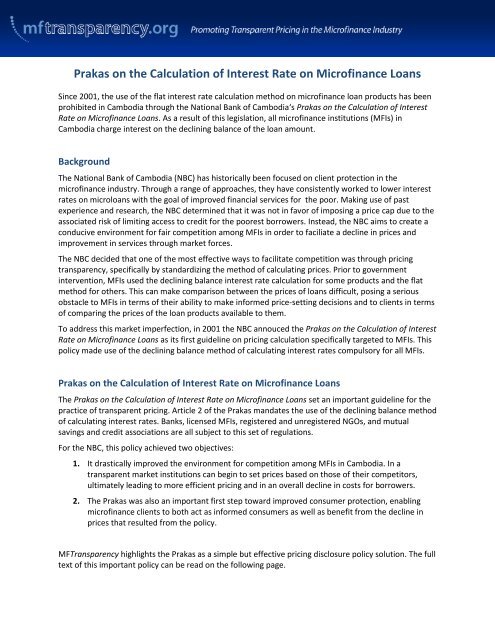Prakas on the Calculation of Interest Rate on Microfinance Loans
Prakas on the Calculation of Interest Rate on Microfinance Loans Prakas on the Calculation of Interest Rate on Microfinance Loans
<str<strong>on</strong>g>Prakas</str<strong>on</strong>g> <strong>on</strong> <strong>the</strong> Calculati<strong>on</strong> <strong>of</strong> <strong>Interest</strong> <strong>Rate</strong> <strong>on</strong> Micr<strong>of</strong>inance <strong>Loans</strong><br />
Since 2001, <strong>the</strong> use <strong>of</strong> <strong>the</strong> flat interest rate calculati<strong>on</strong> method <strong>on</strong> micr<strong>of</strong>inance loan products has been<br />
prohibited in Cambodia through <strong>the</strong> Nati<strong>on</strong>al Bank <strong>of</strong> Cambodia‘s <str<strong>on</strong>g>Prakas</str<strong>on</strong>g> <strong>on</strong> <strong>the</strong> Calculati<strong>on</strong> <strong>of</strong> <strong>Interest</strong><br />
<strong>Rate</strong> <strong>on</strong> Micr<strong>of</strong>inance <strong>Loans</strong>. As a result <strong>of</strong> this legislati<strong>on</strong>, all micr<strong>of</strong>inance instituti<strong>on</strong>s (MFIs) in<br />
Cambodia charge interest <strong>on</strong> <strong>the</strong> declining balance <strong>of</strong> <strong>the</strong> loan amount.<br />
Background<br />
The Nati<strong>on</strong>al Bank <strong>of</strong> Cambodia (NBC) has historically been focused <strong>on</strong> client protecti<strong>on</strong> in <strong>the</strong><br />
micr<strong>of</strong>inance industry. Through a range <strong>of</strong> approaches, <strong>the</strong>y have c<strong>on</strong>sistently worked to lower interest<br />
rates <strong>on</strong> microloans with <strong>the</strong> goal <strong>of</strong> improved financial services for <strong>the</strong> poor. Making use <strong>of</strong> past<br />
experience and research, <strong>the</strong> NBC determined that it was not in favor <strong>of</strong> imposing a price cap due to <strong>the</strong><br />
associated risk <strong>of</strong> limiting access to credit for <strong>the</strong> poorest borrowers. Instead, <strong>the</strong> NBC aims to create a<br />
c<strong>on</strong>ducive envir<strong>on</strong>ment for fair competiti<strong>on</strong> am<strong>on</strong>g MFIs in order to faciliate a decline in prices and<br />
improvement in services through market forces.<br />
The NBC decided that <strong>on</strong>e <strong>of</strong> <strong>the</strong> most effective ways to facilitate competiti<strong>on</strong> was through pricing<br />
transparency, specifically by standardizing <strong>the</strong> method <strong>of</strong> calculating prices. Prior to government<br />
interventi<strong>on</strong>, MFIs used <strong>the</strong> declining balance interest rate calculati<strong>on</strong> for some products and <strong>the</strong> flat<br />
method for o<strong>the</strong>rs. This can make comparis<strong>on</strong> between <strong>the</strong> prices <strong>of</strong> loans difficult, posing a serious<br />
obstacle to MFIs in terms <strong>of</strong> <strong>the</strong>ir ability to make informed price-setting decisi<strong>on</strong>s and to clients in terms<br />
<strong>of</strong> comparing <strong>the</strong> prices <strong>of</strong> <strong>the</strong> loan products available to <strong>the</strong>m.<br />
To address this market imperfecti<strong>on</strong>, in 2001 <strong>the</strong> NBC annouced <strong>the</strong> <str<strong>on</strong>g>Prakas</str<strong>on</strong>g> <strong>on</strong> <strong>the</strong> Calculati<strong>on</strong> <strong>of</strong> <strong>Interest</strong><br />
<strong>Rate</strong> <strong>on</strong> Micr<strong>of</strong>inance <strong>Loans</strong> as its first guideline <strong>on</strong> pricing calculati<strong>on</strong> specifically targeted to MFIs. This<br />
policy made use <strong>of</strong> <strong>the</strong> declining balance method <strong>of</strong> calculating interest rates compulsory for all MFIs.<br />
<str<strong>on</strong>g>Prakas</str<strong>on</strong>g> <strong>on</strong> <strong>the</strong> Calculati<strong>on</strong> <strong>of</strong> <strong>Interest</strong> <strong>Rate</strong> <strong>on</strong> Micr<strong>of</strong>inance <strong>Loans</strong><br />
The <str<strong>on</strong>g>Prakas</str<strong>on</strong>g> <strong>on</strong> <strong>the</strong> Calculati<strong>on</strong> <strong>of</strong> <strong>Interest</strong> <strong>Rate</strong> <strong>on</strong> Micr<strong>of</strong>inance <strong>Loans</strong> set an important guideline for <strong>the</strong><br />
practice <strong>of</strong> transparent pricing. Article 2 <strong>of</strong> <strong>the</strong> <str<strong>on</strong>g>Prakas</str<strong>on</strong>g> mandates <strong>the</strong> use <strong>of</strong> <strong>the</strong> declining balance method<br />
<strong>of</strong> calculating interest rates. Banks, licensed MFIs, registered and unregistered NGOs, and mutual<br />
savings and credit associati<strong>on</strong>s are all subject to this set <strong>of</strong> regulati<strong>on</strong>s.<br />
For <strong>the</strong> NBC, this policy achieved two objectives:<br />
1. It drastically improved <strong>the</strong> envir<strong>on</strong>ment for competiti<strong>on</strong> am<strong>on</strong>g MFIs in Cambodia. In a<br />
transparent market instituti<strong>on</strong>s can begin to set prices based <strong>on</strong> those <strong>of</strong> <strong>the</strong>ir competitors,<br />
ultimately leading to more efficient pricing and in an overall decline in costs for borrowers.<br />
2. The <str<strong>on</strong>g>Prakas</str<strong>on</strong>g> was also an important first step toward improved c<strong>on</strong>sumer protecti<strong>on</strong>, enabling<br />
micr<strong>of</strong>inance clients to both act as informed c<strong>on</strong>sumers as well as benefit from <strong>the</strong> decline in<br />
prices that resulted from <strong>the</strong> policy.<br />
MFTransparency highlights <strong>the</strong> <str<strong>on</strong>g>Prakas</str<strong>on</strong>g> as a simple but effective pricing disclosure policy soluti<strong>on</strong>. The full<br />
text <strong>of</strong> this important policy can be read <strong>on</strong> <strong>the</strong> following page.
PRAKAS<br />
On<br />
The Calculati<strong>on</strong> <strong>of</strong> <strong>Interest</strong> <strong>Rate</strong> <strong>on</strong> Micr<strong>of</strong>inance <strong>Loans</strong><br />
!%<br />
Article 1<br />
./+01%2+3456%78325015934%:0;52+,%?5;0;23%@;7656/65,;7%+3A5763+34%0;4%1523;734%%B+,C%<br />
6D3% E065,;01% &0;



